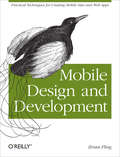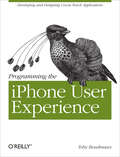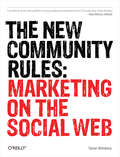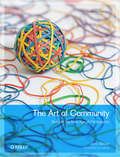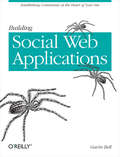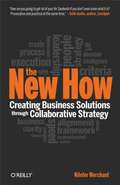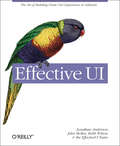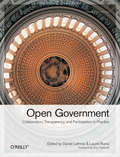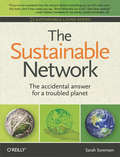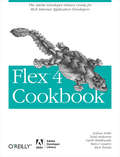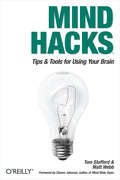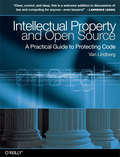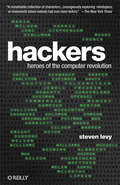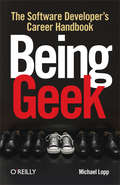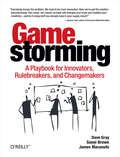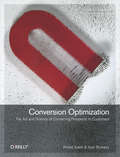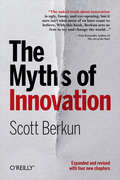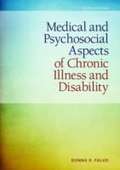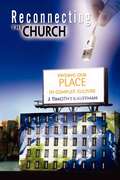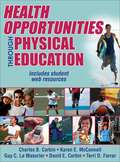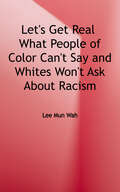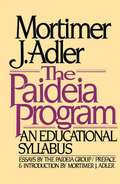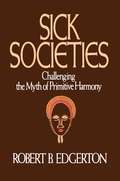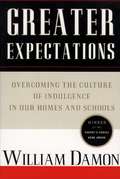- Table View
- List View
Mobile Design and Development: Practical concepts and techniques for creating mobile sites and web apps (Animal Guide)
by Brian FlingMobile devices outnumber desktop and laptop computers three to one worldwide, yet little information is available for designing and developing mobile applications. Mobile Design and Development fills that void with practical guidelines, standards, techniques, and best practices for building mobile products from start to finish. With this book, you'll learn basic design and development principles for all mobile devices and platforms. You'll also explore the more advanced capabilities of the mobile web, including markup, advanced styling techniques, and mobile Ajax. If you're a web designer, web developer, information architect, product manager, usability professional, content publisher, or an entrepreneur new to the mobile web, Mobile Design and Development provides you with the knowledge you need to work with this rapidly developing technology. Mobile Design and Development will help you:Understand how the mobile ecosystem works, how it differs from other mediums, and how to design products for the mobile contextLearn the pros and cons of building native applications sold through operators or app stores versus mobile websites or web appsWork with flows, prototypes, usability practices, and screen-size-independent visual designsUse and test cross-platform mobile web standards for older devices, as well as devices that may be available in the futureLearn how to justify a mobile product by building it on a budget
Programming the iPhone User Experience: Developing and Designing Cocoa Touch Applications
by Toby BoudreauxApple's iPhone and iPod Touch not only feature the world's most powerful mobile operating system, they also usher in a new standard of human-computer interaction through gestural interfaces and multi-touch navigation. This book provides you with a hands-on, example-driven tour of UIKit, Apple's user interface toolkit, and includes common design patterns to help you create new iPhone and iPod Touch user experiences. Using Apple's Cocoa Touch framework, you'll learn how to build applications that respond in unique ways when users tap, slide, swipe, tilt, shake, or pinch the screen. Programming the iPhone User Experience is a perfect companion to Apple's Human Interface Guidelines, and provides the practical information you need to develop innovative applications for the iPhone and iPod Touch, whether you're a CTO, developer, or UI/UX designer.Understand the basics of the Cocoa Touch framework for building iPhone and iPod Touch applications Learn theory and best practices for using Cocoa Touch to develop applications with engaging and effective user interfaces Apply your knowledge of Objective-C to the iPhone/iPod Touch framework Customize standard UIKit views according to Apple's Human Interface Guidelines and usability principles Learn patterns for handling user experience concerns outside of the interface, such as network- and location-awareness
The New Community Rules: Marketing on the Social Web
by Tamar WeinbergBlogs, networking sites, and other examples of the social web provide businesses with a largely untapped marketing channel for products and services. But how do you take advantage of them? With The New Community Rules, you'll understand how social web technologies work, and learn the most practical and effective ways to reach people who frequent these sites. Written by an expert in social media and viral marketing, this book cuts through the hype and jargon to give you intelligent advice and strategies for positioning your business on the social web, with case studies that show how other companies have used this approach. The New Community Rules will help you:Explore blogging and microblogging, and find out how to use applications such as Twitter to create brand awarenessLearn the art of conversation marketing, and how social media thrives on honesty and transparencyManage and enhance your online reputation through the social webTap into the increasingly influential video and podcasting marketDiscover which tactics work -- and which don't -- by learning about what other marketers have triedMany consumers today use the Web as a voice. The New Community Rules demonstrates how you can join the conversation, contribute to the community, and bring people to your product or service.
The Art of Community: Building the New Age of Participation (Theory in Practice)
by Jono BaconOnline communities offer a wide range of opportunities today, whether you're supporting a cause, marketing a product or service, or developing open source software. The Art of Community will help you develop the broad range of talents you need to recruit members to your community, motivate and manage them, and help them become active participants. Author Jono Bacon offers a collection of experiences and observations from his decade-long involvement in building and managing communities, including his current position as manager for Ubuntu, arguably the largest community in open source software. You'll discover how a vibrant community can provide you with a reliable support network, a valuable source of new ideas, and a powerful marketing force.The Art of Community will help you:Develop a strategy, with specific objectives and goals, for building your communityBuild simple, non-bureaucratic processes to help your community perform tasks, work together, and share successesProvide tools and infrastructure that let contributors work quicklyCreate buzz around your community to get more people involvedTrack the community's work so it can be optimized and simplifiedExplore a capable, representative governance strategy for your communityIdentify and manage conflict, including dealing with divisive personalities
Building Social Web Applications: Establishing Community at the Heart of Your Site
by Gavin BellBuilding a web application that attracts and retains regular visitors is tricky enough, but creating a social application that encourages visitors to interact with one another requires careful planning. This book provides practical solutions to the tough questions you'll face when building an effective community site -- one that makes visitors feel like they've found a new home on the Web.If your company is ready to take part in the social web, this book will help you get started. Whether you're creating a new site from scratch or reworking an existing site, Building Social Web Applications helps you choose the tools appropriate for your audience so you can build an infrastructure that will promote interaction and help the community coalesce. You'll also learn about business models for various social web applications, with examples of member-driven, customer-service-driven, and contributor-driven sites. Determine who will be drawn to your site, why they'll stay, and who they'll interact withCreate visual design that clearly communicates how your site worksBuild the software you need versus plugging in one-size-fits-all, off-the-shelf appsManage the identities of your visitors and determine how to support their interactionMonitor demand from the community to guide your choice of new functionsPlan the launch of your site and get the message out
The New How
by Nilofer MerchantWhat people are saying about The New How "How are you going to get rid of your Air Sandwich if you don't even know what it is? Provocative and practical at the same time." --Seth Godin, author of Linchpin "The New How is informative and provides exciting insights because the suggestions are practical and doable. Merchant gets the new reality--leadership fails not so much from flawed strategy as it does from failed processes of engagement from those responsible for implementing the strategy. In high-performing organizations, everyone acts like a leader, and they own the strategy and take actions to ensure its success. If you care about making a difference, read this book." --Barry Posner, author of The Leadership Challenge "Collaboration is a powerful, competitive weapon: this book shows you how to use it to win markets." --Mark Interrante, VP Content Products, Yahoo, Inc. "In a world in which the pace of change is ever quickening, collaboration, not control, is the route to a successful organization. This book tells you how to make your organization collaborative. And Nilofer Merchant's writing is a model of clarity." --Barry Schwartz, author of The Paradox of Choice: Why More Is Less "Want to transform your organization into a collaborative enterprise? Nilofer Merchant provides insightful and practical strategies in The New How." --Padmasree Warrior, CTO, Cisco Systems, Inc. "Merchant's book is a practical guide for the journey from strategy to implementation. The collaborative tools described here can help companies reach strategic success--and avoid pitfalls along the way." --Tom Kelley, General Manager, IDEO, and author of Ten Faces of InnovationOnce in a generation, a book comes along that transforms the business landscape. For today's business leaders, The New How redefines the way companies create strategies and win new markets. Management gurus have always said "people matter." But those same gurus still relegate strategy to an elite set of executives who focus on frameworks, long presentations, and hierarchical approaches. Business strategy typically has been planned by corporate chiefs in annual meetings, and then dictated to managers to carry out. The New How turns that notion on its head. After many years of working with Apple, Adobe, HP, and many other companies, Nilofer Merchant discovered the secret sauce: the best way to create a winning strategy is to include employees at all levels, helping to create strategy they not only believe in, but are also equipped to implement. In The New How, Nilofer shows today's corporate directors, executives, and managers how they can transform their traditional, top-down approach to strategy planning and execution into collaborative "stratecution" that has proven to be significantly more effective. Enhance performance and outcomes by deflating the "air sandwich" between executives in the boardroom and employees Recognize that strategy and execution are thoroughly intertwined Understand how successful strategy is founded in effective idea selection-a pile of good ideas doesn't necessarily build good strategy Create company strategy and link it to targeted execution, using the practical models and techniques provided
Effective UI: The Art of Building Great User Experience in Software
by Jonathan Anderson John Mcree Robb Wilson The EffectiveUI TeamPeople expect effortless, engaging interaction with desktop and web applications, but producing software that generates enjoyable user experiences is much harder than many companies anticipate. With Effective UI, you'll learn proven user-experience strategies that will satisfy your clients and customers, drive business value, and increase brand strength. This book shows you how to capture the collaborative and cooperative spirit among designers, engineers, and management required for building engaging software. You'll also learn valuable methods for maintaining focus throughout the process -- whether you're a product manager who needs a clear roadmap, a developer or designer looking for guidance and advocacy, or a businessperson who wants to understand and manage user-experience software initiatives. Learn how to build software that will:Generate engaging and interactive experiences between consumers and businesses, or between businesspeople and their information systems Account for how people work with, think about, and consume information Establish a richer means of collaboration and communication Reduce frustration by streamlining complex tasks and creating processes that are more intuitive Distinguish products, services, and brands to create a competitive advantage Create scalable systems that adapt to changing user needs and behaviors
Open Government: Collaboration, Transparency, and Participation in Practice
by Daniel Lathrop Laurel RumaIn a world where web services can make real-time data accessible to anyone, how can the government leverage this openness to improve its operations and increase citizen participation and awareness? Through a collection of essays and case studies, leading visionaries and practitioners both inside and outside of government share their ideas on how to achieve and direct this emerging world of online collaboration, transparency, and participation.Contributions and topics include:Beth Simone Noveck, U.S. Deputy Chief Technology Officer for open government, "The Single Point of Failure"Jerry Brito, senior research fellow at the Mercatus Center at George Mason University, "All Your Data Are Belong to Us: Liberating Government Data"Aaron Swartz, cofounder of reddit.com, OpenLibrary.org, and BoldProgressives.org, "When Is Transparency Useful?"Ellen S. Miller, executive director of the Sunlight Foundation, "Disrupting Washington's Golden Rule"Carl Malamud, founder of Public.Resource.Org, "By the People"Douglas Schuler, president of the Public Sphere Project, "Online Deliberation and Civic Intelligence"Howard Dierking, program manager on Microsoft's MSDN and TechNet Web platform team, "Engineering Good Government"Matthew Burton, Web entrepreneur and former intelligence analyst at the Defense Intelligence Agency, "A Peace Corps for Programmers"Gary D. Bass and Sean Moulton, OMB Watch, "Bringing the Web 2.0 Revolution to Government"Tim O'Reilly, founder and CEO of O'Reilly Media, "Defining Government 2.0: Lessons Learned from the Success of Computer Platforms"Open Government editors: Daniel Lathrop is a former investigative projects reporter with the Seattle Post Intelligencer who's covered politics in Washington state, Iowa, Florida, and Washington D.C. He's a specialist in campaign finance and "computer-assisted reporting" -- the practice of using data analysis to report the news. Laurel Ruma is the Gov 2.0 Evangelist at O'Reilly Media. She is also co-chair for the Gov 2.0 Expo.
The Sustainable Network: The Accidental Answer for a Troubled Planet
by Sarah Sorensen"Companies with a stake in the technology industry or that have staked on the Internet (ala Google or Amazon or any of the thousands of small ecommerce companies around the world) are likely to pluck multiple nuggets of wisdom from her book."-- Heather Clancy, business journalistWhat technologies do we need to solve the complex environmental, economic, social, and political challenges facing us today? As this thought-provoking book reveals, one tool for enacting change is already at our fingertips: the global network.Consider the private domains of companies, governments, and institutions along with the public Internet: we have an immense communications network that connects billions of people in ways we never thought possible. In this book, author Sarah Sorensen clearly demonstrates why this network is the best sustainable technology available to help us tackle a wide range of problems.If each of us represents a node on this network, then it's time we realize the potential we hold. The Sustainable Network is a call to action, urging individuals, governments, markets, and organizations to put the power of this network to good use.Discover how the sustainable network connects us all, with examples of how it's already effecting changeUnderstand how this network magnifies the impact of even the smallest change and newest ideaExplore the role that various market and political forces playLearn how the network can be improved to better address environmental, economic, and social conditionsGet practical advice that you or your business can follow now
Flex 4 Cookbook: Real-world recipes for developing Rich Internet Applications
by Joshua Noble Todd Anderson Rich Tretola Marco Casario Garth BraithwaiteWith this collection of proven recipes, you have the ideal problem-solving guide for developing interactive Rich Internet Applications on the Adobe Flash Platform. You'll find answers to hundreds of common problems you may encounter when using Adobe Flex, Flex 4 Framework, or Flash Builder, Adobe's GUI-based development tool. Flex 4 Cookbook has hands-on recipes for everything from Flex basics to solutions for working with visual components and data access, as well as tips on application development, unit testing, and Adobe AIR. Each recipe provides an explanation of how and why it works, and includes sample code that you can use immediately. You'll get results fast, whether you're a committed Flex developer or still evaluating the technology. It's a great way to jumpstart your next web application. Topics include: Using Spark Component Text Layout Framework Groups and Layout Spark List and ItemRenderer Images, bitmaps, videos, and sounds CSS, styling, and skinning States and Effects Working with Collections Using DataBinding Validation, formatting, and regular expressions Using Charts Services and Data Access Using RSLs and Modules Working with Adobe AIR 2.0
Mind Hacks: Tips & Tricks for Using Your Brain
by Tom Stafford Matt WebbThe brain is a fearsomely complex information-processing environment--one that often eludes our ability to understand it. At any given time, the brain is collecting, filtering, and analyzing information and, in response, performing countless intricate processes, some of which are automatic, some voluntary, some conscious, and some unconscious.Cognitive neuroscience is one of the ways we have to understand the workings of our minds. It's the study of the brain biology behind our mental functions: a collection of methods--like brain scanning and computational modeling--combined with a way of looking at psychological phenomena and discovering where, why, and how the brain makes them happen.Want to know more? Mind Hacks is a collection of probes into the moment-by-moment works of the brain. Using cognitive neuroscience, these experiments, tricks, and tips related to vision, motor skills, attention, cognition, subliminal perception, and more throw light on how the human brain works. Each hack examines specific operations of the brain. By seeing how the brain responds, we pick up clues about the architecture and design of the brain, learning a little bit more about how the brain is put together.Mind Hacks begins your exploration of the mind with a look inside the brain itself, using hacks such as "Transcranial Magnetic Stimulation: Turn On and Off Bits of the Brain" and "Tour the Cortex and the Four Lobes." Also among the 100 hacks in this book, you'll find:Release Eye Fixations for Faster ReactionsSee Movement When All is StillFeel the Presence and Loss of AttentionDetect Sounds on the Margins of CertaintyMold Your Body SchemaTest Your HandednessSee a Person in Moving LightsMake Events Understandable as Cause-and-EffectBoost Memory by Using ContextUnderstand Detail and the Limits of AttentionSteven Johnson, author of "Mind Wide Open" writes in his foreword to the book, "These hacks amaze because they reveal the brain's hidden logic; they shed light on the cheats and shortcuts and latent assumptions our brains make about the world." If you want to know more about what's going on in your head, then Mind Hacks is the key--let yourself play with the interface between you and the world.
Intellectual Property and Open Source: A Practical Guide to Protecting Code
by Van Lindberg"Clear, correct, and deep, this is a welcome addition to discussions of law and computing for anyone -- even lawyers!"-- Lawrence Lessig, Professor of Law at Stanford Law School and founder of the Stanford Center for Internet and SocietyIf you work in information technology, intellectual property is central to your job -- but dealing with the complexities of the legal system can be mind-boggling. This book is for anyone who wants to understand how the legal system deals with intellectual property rights for code and other content. You'll get a clear look at intellectual property issues from a developer's point of view, including practical advice about situations you're likely to encounter.Written by an intellectual property attorney who is also a programmer, Intellectual Property and Open Source helps you understand patents, copyrights, trademarks, trade secrets, and licenses, with special focus on the issues surrounding open source development and the GPL. This book answers questions such as:How do open source and intellectual property work together?What are the most important intellectual property-related issues when starting a business or open source project?How should you handle copyright, licensing and other issues when accepting a patch from another developer?How can you pursue your own ideas while working for someone else?What parts of a patent should be reviewed to see if it applies to your work?When is your idea a trade secret?How can you reverse engineer a product without getting into trouble?What should you think about when choosing an open source license for your project?Most legal sources are too scattered, too arcane, and too hard to read. Intellectual Property and Open Source is a friendly, easy-to-follow overview of the law that programmers, system administrators, graphic designers, and many others will find essential.
Hackers: Heroes of the Computer Revolution - 25th Anniversary Edition
by Steven LevyThis 25th anniversary edition of Steven Levy's classic book traces the exploits of the computer revolution's original hackers -- those brilliant and eccentric nerds from the late 1950s through the early '80s who took risks, bent the rules, and pushed the world in a radical new direction. With updated material from noteworthy hackers such as Bill Gates, Mark Zuckerberg, Richard Stallman, and Steve Wozniak, Hackers is a fascinating story that begins in early computer research labs and leads to the first home computers.Levy profiles the imaginative brainiacs who found clever and unorthodox solutions to computer engineering problems. They had a shared sense of values, known as "the hacker ethic," that still thrives today. Hackers captures a seminal period in recent history when underground activities blazed a trail for today's digital world, from MIT students finagling access to clunky computer-card machines to the DIY culture that spawned the Altair and the Apple II.
Being Geek: The Software Developer's Career Handbook
by Michael LoppAs a software engineer, you recognize at some point that there's much more to your career than dealing with code. Is it time to become a manager? Tell your boss he’s a jerk? Join that startup? Author Michael Lopp recalls his own make-or-break moments with Silicon Valley giants such as Apple, Netscape, and Symantec in Being Geek -- an insightful and entertaining book that will help you make better career decisions.With more than 40 standalone stories, Lopp walks through a complete job life cycle, starting with the job interview and ending with the realization that it might be time to find another gig. Many books teach you how to interview for a job or how to manage a project successfully, but only this book helps you handle the baffling circumstances you may encounter throughout your career.Decide what you're worth with the chapter on "The Business"Determine the nature of the miracle your CEO wants with "The Impossible"Give effective presentations with "How Not to Throw Up"Handle liars and people with devious agendas with "Managing Werewolves"Realize when you should be looking for a new gig with "The Itch"
Gamestorming: A Playbook for Innovators, Rulebreakers, and Changemakers (O'reilly Ser.)
by James Macanufo Sunni Brown Dave GrayGreat things don't happen in a vacuum. But creating an environment for creative thinking and innovation can be a daunting challenge. How can you make it happen at your company? The answer may surprise you: gamestorming.This book includes more than 80 games to help you break down barriers, communicate better, and generate new ideas, insights, and strategies. The authors have identified tools and techniques from some of the world's most innovative professionals, whose teams collaborate and make great things happen. This book is the result: a unique collection of games that encourage engagement and creativity while bringing more structure and clarity to the workplace. Find out why -- and how -- with Gamestorming.Overcome conflict and increase engagement with team-oriented gamesImprove collaboration and communication in cross-disciplinary teams with visual-thinking techniquesImprove understanding by role-playing customer and user experiencesGenerate better ideas and more of them, faster than ever beforeShorten meetings and make them more productiveSimulate and explore complex systems, interactions, and dynamicsIdentify a problem's root cause, and find the paths that point toward a solution
Conversion Optimization: The Art and Science of Converting Prospects to Customers
by Khalid Saleh Ayat ShukairyHow do you turn website visitors into customers?Conversion Optimization offers practical advice on how to persuade visitors to make a buying decision -- without driving them away through data overload or tedious navigation. You'll learn how to use marketing principles, design, usability, and analytics on your site to increase your buyer-to-visitor ratio, whether you're involved with marketing or designing a large ecommerce site, or managing a modest online operation.Based on the authors' broad experience in helping businesses attract online customers, this book addresses every aspect of the process, from landing visitors to finalizing the sale. You'll learn several techniques for blending successful sales approaches with the particular needs of the people you want to attract. Are you ready to do what it takes to get a double-digit conversion rate?Explore case studies involving significant conversion rate improvementsWalk through different stages of a sale and understand the value of eachUnderstand your website visitors through persona creationConnect with potential customers and guide them toward a conversionLearn how to deal with FUDs -- customer fears, uncertainties, and doubtsExamine the path that visitors take from landing page to checkoutTest any change you make against your original design"The Web is unique in its ability to deliver this almost improbable win-win: You can increase revenue AND make your customers happy. Yet most websites stink. Worry not, Khalid and Ayat to the rescue! Buy this book to follow their practical advice on how to create high converting websites that your visitors love."--Avinash Kaushik, author of Web Analytics 2.0 and Web Analytics: An Hour A Day (both Sybex)
The Myths of Innovation
by Scott BerkunIn this new paperback edition of the classic bestseller, you'll be taken on a hilarious, fast-paced ride through the history of ideas. Author Scott Berkun will show you how to transcend the false stories that many business experts, scientists, and much of pop culture foolishly use to guide their thinking about how ideas change the world. With four new chapters on putting the ideas in the book to work, updated references and over 50 corrections and improvements, now is the time to get past the myths, and change the world.You'll have fun while you learn:Where ideas come fromThe true history of historyWhy most people don't like ideasHow great managers make ideas thriveThe importance of problem findingThe simple plan (new for paperback)Since its initial publication, this classic bestseller has been discussed on NPR, MSNBC, CNBC, and at Yale University, MIT, Carnegie Mellon University, Microsoft, Apple, Intel, Google, Amazon.com, and other major media, corporations, and universities around the world. It has changed the way thousands of leaders and creators understand the world. Now in an updated and expanded paperback edition, it's a fantastic time to explore or rediscover this powerful view of the world of ideas."Sets us free to try and change the world."--Guy Kawasaki, Author of Art of The Start"Small, simple, powerful: an innovative book about innovation."--Don Norman, author of Design of Everyday Things"Insightful, inspiring, evocative, and just plain fun to read. It's totally great."--John Seely Brown, Former Director, Xerox Palo Alto Research Center (PARC)"Methodically and entertainingly dismantling the cliches that surround the process of innovation."--Scott Rosenberg, author of Dreaming in Code; cofounder of Salon.com"Will inspire you to come up with breakthrough ideas of your own."--Alan Cooper, Father of Visual Basic and author of The Inmates are Running the Asylum"Brimming with insights and historical examples, Berkun's book not only debunks widely held myths about innovation, it also points the ways toward making your new ideas stick."--Tom Kelley, GM, IDEO; author of The Ten Faces of Innovation
Medical and Psychosocial Aspects of Chronic Illness and Disability (Fifth Edition)
by Donna R. FalvoThis book is designed as a reference for non-medical professionals and as a text for students who have little prior medical knowledge but who work with individuals with chronic illness and disability.
Reconnecting The Church
by J. Timothy KauffmanReconnecting the Church is offered as a practical guide to assist pastors and laypeople in understanding the city, engaging, and serving the local community in which the church is located. The book’s purpose is to come along side the local church that wishes to reconnect to its local community, and offer practical ways to accomplish that task. There are 25 chapters each of which describes briefly an aspect of life in the city. At the end of each chapter are practical action/reflection projects. These projects are designed to give the reader first-hand experience of their church’s immediate neighborhood. They are specific tasks, most of which will be done outside the church. Each action is described, and guidance is given for reflection after each project.
Health Opportunities Through Physical Education
by Charles B. Corbin Guy C. Le Masurier Karen E. McConnell David E. Corbin Terri D. FarrarNIMAC-sourced textbook
Let's Get Real: What People of Color Can't Say and Whites Won't Ask
by Lee Mun WahThis new book by Lee Mun Wah explores the questions people of color and whites are afraid to ask of each other and the answers that we are afraid to hear. Over 150 folks from all over the country participated in "breaking the silence" about what separates and divides us as a nation, in our workplaces, and as friends. <p><p>The goal of this book is to initiate an environment that will support an open, intimate, and honest dialogue for all of us regarding the issues of racism-what makes it safe or unsafe to share our truths, how denial erodes our willingness to trust, and the myriad of ways that we use to shield ourselves from being hurt or held accountable. <p><p>Chapters in Section One, for People of Color, include: Telling the Truth About Racism to Whites, A Question of Safety, Personal Journeys, and Unlearning Racism: What It Will Take. <p><p>Section Two for Whites includes: Telling the Truth, Working with Other Whites, Working with People of Color, Personal Stories, What is Needed to Unlearn Racism, and What It Will Take.
Nursing for Wellness in Older Adults (Seventh Edition)
by Carol A. MillerThis 7th edition of Nursing for Wellness in Older Adults prepares your students to provide effective, wellness-oriented nursing care for older adults in any healthcare setting. The book provides comprehensive, easy-to-understand coverage of the theory and practice of gerontological nursing, addressing both physiologic and psychosocial aspects of aging, as well as broader issues such as cultural competence and legal and ethical concerns.
Paideia Program: An Educational Syllabus
by Mortimer J. AdlerPaideia is a holistic approach to life-long learning with roots in ancient Greece.The Paideia Program is based on the belief that the human species is defined by its capacity and desire for learning. The program itself argues for a public education that is at once more rigorous and more accessible.
Sick Societies: Challenging the Myth of Primitive Harmony
by Robert B. EdgertonAuthor and scholar Robert Edgerton challenges the notion that primitive societies were happy and healthy before they were corrupted and oppressed by colonialism. He surveys a range of ethnographic writings, and shows that many of these so-called innocent societies were cruel, confused, and misled.
Greater Expectations: Nuturing Children's Natural Moral Growth
by William DamonGreater Expectations is the book that exposed the low standards that children are confronted with in our homes, our schools, and throughout our culture. It exploded many of the misconceptions about children and how to raise them, including the cult of self-esteem, "child-centered" learning, and other overly indulgent practices that have been watering down the education and guidance that we are providing our young people. It disclosed how the self-centered ethic is damaging our youth. Greater Expectations started America talking about these issues and about how young people need to be provided with challenges and a sense of purpose if we want them to survive and thrive in life.Provocative and challenging, Greater Expectations was a wake-up call, a must-read for anyone concerned about the growing youth crisis in America and what we can do about it.
